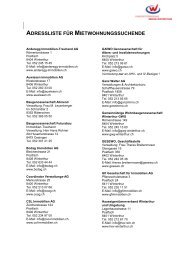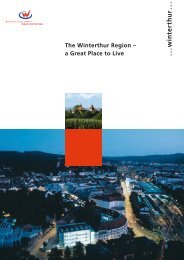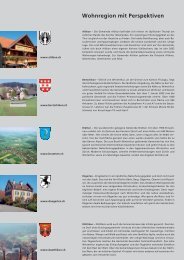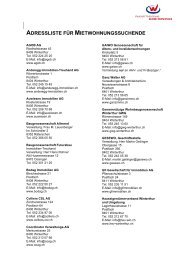Handbook for Investors. Business location in Switzerland.
Handbook for Investors. Business location in Switzerland.
Handbook for Investors. Business location in Switzerland.
Create successful ePaper yourself
Turn your PDF publications into a flip-book with our unique Google optimized e-Paper software.
13.2.1 Re<strong>location</strong><br />
A move to a <strong>for</strong>eign country raises many questions depend<strong>in</strong>g on<br />
one’s <strong>in</strong>dividual situation. Which school is the most appropriate?<br />
Where can you shop? How do we f<strong>in</strong>d a house? How high are the<br />
taxes, duties and other fees? There are competent, <strong>in</strong>ternationally<br />
experienced consultants <strong>in</strong> all parts of the country who can give<br />
further assistance with these issues. Specialized re<strong>location</strong> agencies<br />
offer comprehensive packages that cover re<strong>location</strong> issues<br />
and the <strong>in</strong>itial orientation period <strong>in</strong> <strong>Switzerland</strong>. The Internet offers<br />
a wealth of <strong>in</strong><strong>for</strong>mation. A number of the cantonal economic development<br />
agencies also have their own onl<strong>in</strong>e <strong>in</strong><strong>for</strong>mation plat<strong>for</strong>ms<br />
that cater specifically to expatriates.<br />
Household items, personal collections, animals or a car can be<br />
imported <strong>in</strong>to <strong>Switzerland</strong> duty-free. The only requirement is that<br />
the imported objects must have been used by you personally <strong>for</strong> at<br />
least six months and will cont<strong>in</strong>ue to be used by you after import.<br />
Upon enter<strong>in</strong>g the country, you must present assurance that a residence<br />
permit will be granted (or an employment contract, tenancy<br />
agreement or deregistration certificate from the previous country<br />
of residence <strong>for</strong> citizens of EU-17 or EFTA countries) as well as a<br />
completed application <strong>for</strong>m.<br />
After enter<strong>in</strong>g <strong>Switzerland</strong>, you are required to register with<strong>in</strong> the<br />
first eight days <strong>in</strong> the municipality <strong>in</strong> which you will reside. The<br />
follow<strong>in</strong>g documents are required:<br />
• Valid official identity document such as passport or identity<br />
card (<strong>for</strong> each family member enter<strong>in</strong>g the country)<br />
• Confirmation of health <strong>in</strong>surance (proof of mandatory basic<br />
coverage). The period <strong>for</strong> register<strong>in</strong>g with a Swiss health <strong>in</strong>surance<br />
fund is three months, so confirmation of health <strong>in</strong>surance<br />
can also be submitted later<br />
• One passport photo (<strong>for</strong> each family member enter<strong>in</strong>g the<br />
country)<br />
• Personal documents (e.g. extract from register of births and<br />
marriages, marriage certificate, birth certificates <strong>for</strong> m<strong>in</strong>or<br />
children, etc.)<br />
• Employment contract<br />
If a vehicle is be<strong>in</strong>g brought <strong>in</strong>to <strong>Switzerland</strong>, it must be <strong>in</strong>sured<br />
and licensed <strong>in</strong> <strong>Switzerland</strong> with<strong>in</strong> twelve months. A Swiss driver’s<br />
license is also required with<strong>in</strong> the same time period.<br />
Customs <strong>in</strong><strong>for</strong>mation about re<strong>location</strong><br />
www.ezv.adm<strong>in</strong>.ch<br />
L<strong>in</strong>k: In<strong>for</strong>mation <strong>for</strong> private <strong>in</strong>dividuals > Important note ><br />
Mov<strong>in</strong>g house …<br />
Languages: German, English, French, Italian<br />
Tips and price comparisons<br />
www.comparis.ch/immigration<br />
Languages: German, English, French, Italian<br />
13.2.2 Language courses<br />
Many Swiss citizens understand English and/or a second national<br />
language of <strong>Switzerland</strong>. In order to become <strong>in</strong>tegrated <strong>in</strong>to Swiss<br />
society, however, knowledge of the national language spoken <strong>in</strong><br />
the particular region is a great advantage. Depend<strong>in</strong>g on the area,<br />
the language may be German (spoken by 63.7 % of the Swiss<br />
population), French (20.4 %), Italian (6.5 %) or Romansh (0.5 %).<br />
The fact that there are four national languages <strong>in</strong> <strong>Switzerland</strong><br />
does not mean, however, that all Swiss people can speak four<br />
languages.<br />
There are large numbers of private companies and <strong>in</strong>dividuals offer<strong>in</strong>g<br />
language courses tailored to every need. Public <strong>in</strong>stitutions<br />
also offer language courses <strong>in</strong> the respective national language<br />
<strong>in</strong> conjunction with immigrant <strong>in</strong>tegration ef<strong>for</strong>ts. Consult<strong>in</strong>g the<br />
Yellow Pages or the website of the Swiss Federation <strong>for</strong> Adult<br />
Learn<strong>in</strong>g is recommended.<br />
Languages <strong>in</strong> <strong>Switzerland</strong><br />
www.swissworld.org<br />
Languages: German, English, French, Italian, Spanish,<br />
Russian, Ch<strong>in</strong>ese, Japanese<br />
122 <strong>Handbook</strong> <strong>for</strong> <strong>Investors</strong> 2010









